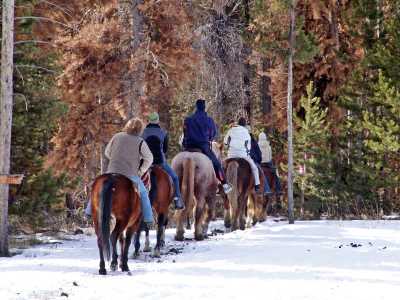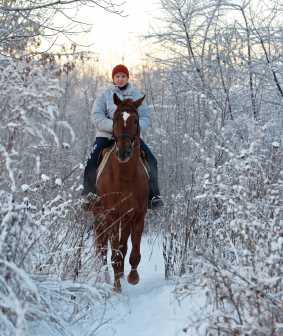|
By Jerry Tardif
If you're a ring rider venturing out onto the trail for the first time, or you've done a trail ride or two and are now at a point in your life where you'd like to transition to more regularly riding the trails, there can naturally be some trepidation as you move from a controlled environment to the open spaces.
Also, a horse's herd mentality doesn't manifest itself much in the ring, but it reigns supreme out on the trail and you need to know how to deal with it.
Let's start at the beginning.
Preparation is important for almost every pursuit.
In the case of trail riding, preparation increases the chances you'll have an uneventful and fun ride.
And in the case where something does go wrong, prior preparation greatly increases the chances you'll be prepared to deal with the event.

Trail Riding with Friends.
Another thing worth mentioning: though I started riding in the ring as an English rider, found it very constraining, and never really enjoyed it, I still learned a lot in that period and it has proven very valuable out on the trail — I'm positive the same will be true for you.
The ring is a great and safe place to learn new riding techniques and a great place to train your horse with minimal distractions.
So, while your interests are now moving more toward the trail, your past skills and experience in the ring will still prove valuable as mentioned above.
You'll also still occasionally want to spend time in the ring to work out other riding and training issues as they come up.
The HorseGirl often says that "all riding is good riding" and that "all disciplines have much to offer in making us better riders".
She's one of the best and most consistent riders I've seen, and I have to completely agree with her insightful and wise comments (not her wisecracks, however...)
As for riding dangers, trail riding is not a highly dangerous activity.
Rather, the main difference is that there are more opportunities for your horse to get surprised.
As your horse experiences more and more situations, they all become comfortable for him and he'll become a consistent companion.
Horses are running machines and most horses love to gallop, especially with other horses and riders.
If you've not done much or any galloping, please understand that your horse doesn't need to do flat-out gallop at 40 MPH.
Most horses love the occasional 20 - 25MPH spurts that go on for a quarter mile or so on a dirt or grass road and then settle back to a walk or trot.
And if you've never done such a leisurely gallop with a group of other riders, you're in for a treat.
It's exhilarating for both horse and rider — once you're comfortable with it, you're going to love it!
Many times, my fellow riders (men and women) are giggling like little school children during and after a gallop — it's that much fun and exciting, and it doesn't have to be a fast gallop.
This list indicates the kinds of things that may initially cause concern in your horse:
- Crossing a stream
- Crossing a wooden bridge
- Passing a barking dog or several dogs
- Being passed by a car or truck
- Hearing leaves rustling in the trees at the beginning of Autumn
- Seeing other moving animals (deer, foxes, large birds, etc.)
- Seeing flapping items (windblown cloths or tarps)
- Seeing moving items (blown paper, trash, and other light debris)
There are more such "stimuli" for your horse — you get the idea.
The foregoing cause concern because they're new to your horse.
Once they become familiar, they won't bother him.
For your first few rides, make sure to go with other riders and keep the rides short and close to the barn.
Also, keep the speed to the walk and slow trots.
If your horse is anxious, you don't want to get up into the faster gaits.
Instead, you want to let him see, hear, and smell all that is around him.
Make sure you've already explained this to your riding companions and that they'll be ok with stopping for a minute just to let your horse explore his surroundings and to take in and analyze what he's seeing, hearing, and smelling.
Short, close trips work well for that.
As time goes on, your horse will become more comfortable, the rides will get longer, and you'll both be able to enjoy faster gaits and longer trips away from the barn.
There's lots more to say about this topic than can be included in this article, so we're only hitting the highlights.
But one more thing that I feel we can't leave out is horse psychology.
Remember that your horse is a prey animal and that he's on constant alert — it literally is the nature of this beast.
Your horse is going to take his emotional cues from you.
If you're calm, he'll be calm.
If you're scared, he'll definitely feel it and be scared himself.
For reasons I'll never understand, it seems that most people spook much worse than their horses.
I've been on rides where a person walking with two dogs in the distance terrifies one or more riders because they're afraid their horse will be afraid of the dogs and spook.
You can't be afraid like that — your horse will determine his fear or calmness from you.
If you suddenly squeeze with your legs, your horse will notice something has changed for the worse and get anxious — don't do that.
So ask yourself, if your horse gets really scared, can you stay calm?
If you can't, you're not ready to ride very far from the barn — YOU must stay calm and in control!
After all, you can't leave an animal in control of your safety.
If your horse does get spooked, talk to him in a soft, calm voice.
If there's an animal, turn him to face the animal and let him observe, smell, and listen.
Most animals will do the same and then walk the other way — your horse will settle down.
And before your next ride, work with a trainer to get your horse used to barking dogs.
Then, their next encounter is no big deal and seeing dogs on the trail won't concern either of you.
Of course, you'll still be vigilant and careful, but your heart rate won't change and elevate that of your horse.

|
In time, you'll even be comfortable riding alone.
There are times when I enjoy going out on the trail with just my horse.
I don't have to be concerned with whether or not I'm riding too fast for someone or taking too much time.
Sometimes, my horse will see something, such as a deer, and wants to stand still for a minute or two just observing and smelling the air.
If I stop for too long when with a group, invariably another rider that doesn't share the moment will push for us to get going.
When alone, I can give my horse as much time as he'd like.
Life can be pushy, whether it's from our careers, family needs, or some other responsibility.
It's wonderful to have the luxury to just stand there for a change.
|
Similarly, we can change gaits or break into a gallop whenever we want without concern for the safety of others.
I don't want to always ride alone, but I definitely do enjoy it from time to time.
You may also want to check out a closely related article entitled: Getting into Trail Riding.
Riding the trail has as much to do with the rider's psychology as the horse's.
And once you and your horse have it all worked out, you'll be having so much fun that you'll often ask yourself why your weren't riding the trails as part of your horse's life in prior years.
Have fun!
Besides being an avid trail rider, Jerry Tardif is a technology consultant and a horse and nature photographer in SE Connecticut — see his work at: www.jerrytardif.com.
He is also co-founder and President of QueryHorse.
Back to Article Index
|